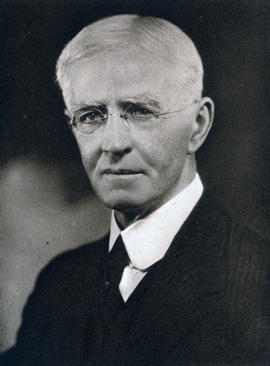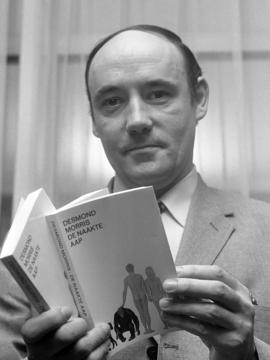Curator of Mammals at London Zoo. He was Director of Chester Zoo 1978-1995. He won the 1999 Silver Medal of the Zoological Society of London.
Office Boy, later Clerk and Public Relations Officer at ZSL London Zoo. Created Pets Corner
Mitchell was the son of Rev. Alexander Mitchell, a Presbyterian minister in Dunfermline, Scotland, and Marion Chalmers. He gained his MA at the University of Aberdeen, and then went to Christ Church, Oxford, where he read natural sciences, specialising in zoology. After his honours examination in 1888, he was appointed University Demonstrator in Zoology.
In 1911 he delivered the Royal Institution Christmas Lecture on 'The Childhood of Animals'.
In 1896 he was the anonymous author of an article in the Saturday Review entitled 'A Biological View of English Foreign Policy', which proposed the inevitability of a final battle between Britain and Germany, in which one would be destroyed. In February 1915 He gave three lectures on the subject of evolution and foreign policy at the Royal Institution that expanded on his 1896 article. These were combined and published in the form of a book entitled 'Evolution and the War' in May 1915. In April 1916, now an Army Captain, he was made responsible for setting up a specialist department MI7(B)4 to oversee the production of military propaganda to be dropped from the air over enemy lines.
He was Secretary of the Zoological Society of London from 1903-1935, second in length of office to his predecessor Philip Lutley Sclater. Mitchell's brainchild, Whipsnade Zoo, was opened in 1931 on the Dunstable Downs, Bedfordshire. In 1933 he was one of eleven people involved in the appeal which led to the foundation of the British Trust for Ornithology.
On retiring, he moved to Malaga, staying there during the first six months or so of the Spanish Civil War, until the city was taken on behalf of the rebels by Italian troops. An account of his last days in Malaga, including his arrest along with Arthur Koestler, is included in Koestler's book 'Spanish Testament' and in his own memoir 'My House in Malaga', published in 1938.
Mitchell died on 2nd July 1945 after being injured in an accident on 29th June outside London Zoo. After stepping off a bus, he was struck by a taxicab. A species of South American worm lizard, Amphisbaena mitchelli, is named in his honour. He also proved in the treatise 'On the Intestinal Tract of Mammals' that the caecum of mammals is directly homologous with the paired caeca of birds.
Desmond John Morris is an English zoologist, ethologist and surrealist painter, as well as an author in human sociobiology. He is known for his 1967 book 'The Naked Ape' and for his television programmes such as 'Zoo TIme'.
Morris was born in Purton, Wiltshire, to Marjorie (nee Hunt) and children's fiction author Harry Morris. He was educated at Dauntsey's School, Wiltshire. In 1946 he joined the British Army for two years of national service, becoming a lecturer in fine arts at the Chiseldon Army College in Wiltshire. After being demobilised he studied zoology at the University of Birmingham. In 1951 he began a doctorate at the Department of Zoology, University of Oxford, in animal behaviour. In 1954 he earned a Doctor of Philosophy for his work on the reproductive behaviour of the ten-spined stickleback.
In 1956 he moved to London as Head of the Granada TV and Film Unit for the Zoological Society of London, and studies the picture-making abilities of apes. The work included creating programmes for film and television on animal behaviour and other zoology topics. He hosted Granada TV's weekly 'Zoo Time' programme until 1959, and 'Life in the Animal World' for BBC2. In 1957 he organised an exhibition at the Institute of Contemporary Arts in London, showing paintings and drawings composed by common chimpanzees. In 1958 he co-organised an exhibition, 'The Lost Image', which compared pictures by infants, human adults and apes, at the Royal Festival Hall, London. In 1959 he left 'Zoo Time' to become the Zoological Society of London's Curator of Mammals. In 1964 he delivered the Royal Institution Christmas Lecture on Animal Behaviour. In 1967 he spent a year as Executive Director of the London Institute of Contemporary Arts.
Morris's books include 'The Naked Ape: A Zoologist's Study of the Human Animal' (1967). Morris moved to Malta in 1968 to write a sequel and other books. In 1973 he returned to Oxford to work for the ethologist Niko Tinbergen. From 1973 to 1981, Morris was a Research Fellow at Wolfson College, Oxford. In 1979 he undertook a television series for Thames TV, 'The Human Race', followed in 1982 by 'Man Watching in Japan, The Animals Road Show' in 1986 and then several other series. National Life Stories conducted an oral history interview (C1672/16) with Morris in 2015 for its Science and Religion collection held by the British Library.
Curator of Birds

